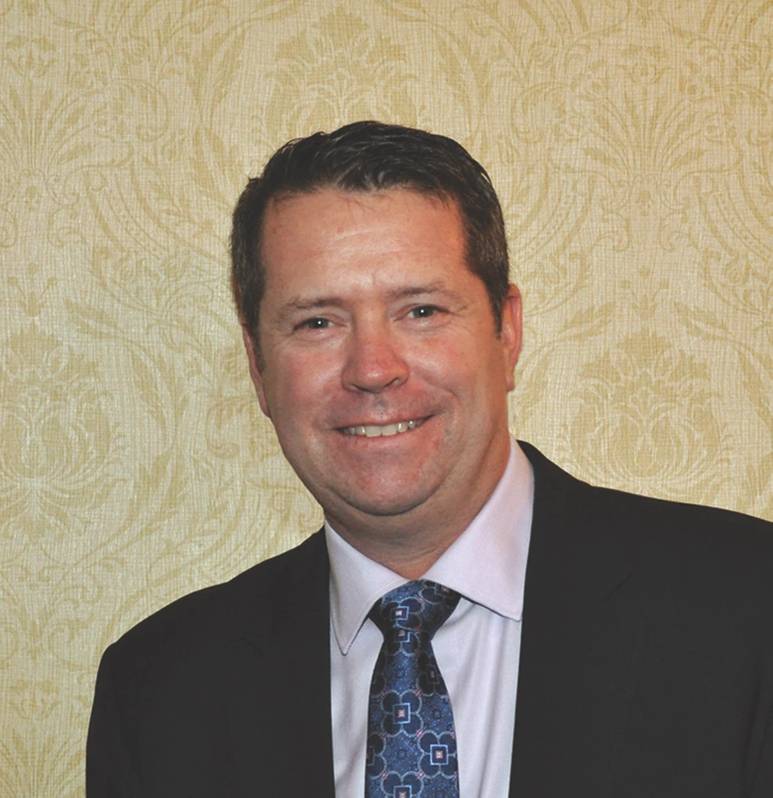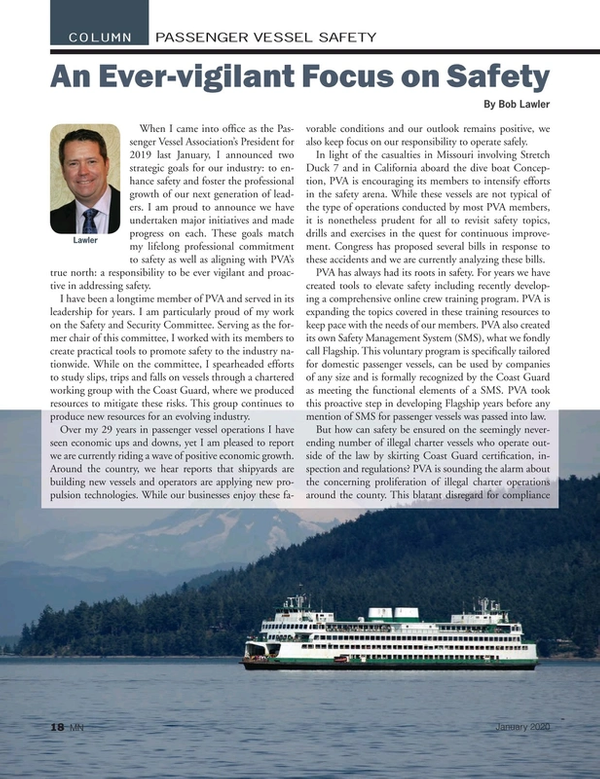
An Ever-vigilant Focus on Passenger Vessel Safety
When I came into office as the Passenger Vessel Association’s President for 2019 last January, I announced two strategic goals for our industry: to enhance safety and foster the professional growth of our next generation of leaders. I am proud to announce we have undertaken major initiatives and made progress on each. These goals match my lifelong professional commitment to safety as well as aligning with PVA’s true north: a responsibility to be ever vigilant and proactive in addressing safety.
I have been a longtime member of PVA and served in its leadership for years. I am particularly proud of my work on the Safety and Security Committee. Serving as the former chair of this committee, I worked with its members to create practical tools to promote safety to the industry nationwide. While on the committee, I spearheaded efforts to study slips, trips and falls on vessels through a chartered working group with the Coast Guard, where we produced resources to mitigate these risks. This group continues to produce new resources for an evolving industry.
Over my 29 years in passenger vessel operations I have seen economic ups and downs, yet I am pleased to report we are currently riding a wave of positive economic growth. Around the country, we hear reports that shipyards are building new vessels and operators are applying new propulsion technologies. While our businesses enjoy these favorable conditions and our outlook remains positive, we also keep focus on our responsibility to operate safely.
In light of the casualties in Missouri involving Stretch Duck 7 and in California aboard the dive boat Conception, PVA is encouraging its members to intensify efforts in the safety arena. While these vessels are not typical of the type of operations conducted by most PVA members, it is nonetheless prudent for all to revisit safety topics, drills and exercises in the quest for continuous improvement. Congress has proposed several bills in response to these accidents and we are currently analyzing these bills.
PVA has always had its roots in safety. For years we have created tools to elevate safety including recently developing a comprehensive online crew training program. PVA is expanding the topics covered in these training resources to keep pace with the needs of our members. PVA also created its own Safety Management System (SMS), what we fondly call Flagship. This voluntary program is specifically tailored for domestic passenger vessels, can be used by companies of any size and is formally recognized by the Coast Guard as meeting the functional elements of a SMS. PVA took this proactive step in developing Flagship years before any mention of SMS for passenger vessels was passed into law.
But how can safety be ensured on the seemingly never-ending number of illegal charter vessels who operate outside of the law by skirting Coast Guard certification, inspection and regulations? PVA is sounding the alarm about the concerning proliferation of illegal charter operations around the county. This blatant disregard for compliance with minimum requirements poses a major threat to public safety. We appreciate that the Coast Guard has stepped-up its enforcement efforts and we urge them to keep the pressure on by issuing fines and prosecuting illegal charter operators.
Our efforts to promote safety also hinge on our strong relationship with the Coast Guard. Coast Guard inspectors regularly visit and inspect our vessels and having their direct involvement is essential to successfully promoting safety. An engaged, well-trained, and adequately funded Coast Guard Marine Safety Mission is vital.
Recently, PVA’s Vice President, Colleen Stephens, of Stan Stephens Glacier & Wildlife Cruises in Valdez, Alaska, testified before Congress on behalf of PVA. In her statement, she urged Congress to fully fund the Coast Guard’s Marine Safety Mission and ensure that this function is well-maintained. Additionally, Stephens urged Congress to evaluate the implementation of the Coast Guard’s action plan entitled Enhancing the Coast Guard’s Marine Safety Program, which was issued in 2007 to address Congress’ concerns surrounding the Agency’s deteriorating safety inspection functions. PVA also advocated that inspections of passenger vessels remain entirely within the Coast Guard and not handed off to third parties, as has been done for other segments of the maritime industry. We believe that Coast Guard safety personnel have a greater level of expertise and intimate knowledge of our vessels and the routes on which we operate than do third-party organizations. Keeping direct Coast Guard inspection of our vessels and providing them with the resources they need is the best way to promote safety.
My other goal for the year, of building-up our next generation of leaders, goes hand-in-hand with safety. Prioritizing safety is a part of company culture and we want our teams to be well supported in all areas of professional development. In January 2019, PVA launched the Emerging Leaders Committee with the mission to support the growing community of individuals transitioning into leadership roles in their companies. This group encourages professional growth through seminars, resources and online forums. This year’s PVA Annual Convention at MariTends 2020 in Tampa, Fla., February 3-6, will feature a host of sessions specifically tailored to the needs of our emerging leaders.
I am encouraged by this highly engaged group of individuals; they are already guiding PVA’s future by highlighting emergent issues of importance to the passenger vessel industry. The emerging leaders that we foster today will be the PVA presidents of tomorrow, and I am excited for the bright future ahead for our industry.
 Bob Lawler is currently General Manger for Boston Duck Tours in Boston. Boston Duck Tours operates 28 amphibious vehicles carrying more than 600,000 passenger each year. Lawler began his career in the maritime industry in 1990 as a deckhand with Bay State Cruise Company in Boston. After graduating from Marquette University in Milwaukee, Wisc. in 1993, he obtained his 100-ton Master’s license and worked as a full time Captain for Entertainment Cruises over the next 11 years in Boston, Chicago and Seattle before returning home to Boston where he worked as General Manager and VP of Marine Operations for a fleet or 38 vessels in 6 ports until 2017. The company’s brands include Spirit Cruises, Odyssey, Bateaux New York, Elite Private Yachts, Mystic Blue Cruises, Seadog and Potomac Riverboat Company. Lawler has served as 2018 PVA Vice President, 2017 PVA Secretary-Treasurer, as a member of the PVA Board of Directors and was Chairman of PVA Safety and Security Committee from 2014 to 2016. |
Read An Ever-vigilant Focus on Passenger Vessel Safety in Pdf, Flash or Html5 edition of January 2020 Marine News
Other stories from January 2020 issue
Content
- Red and White and Green All Over page: 12
- Fishing for Trouble page: 16
- An Ever-vigilant Focus on Passenger Vessel Safety page: 18
- Ferry Industry Sets Pace on Critical Solutions page: 20
- Vessel Safety: US House Subcommittee Seeks Faster Implementation page: 24
- Vessel Inspections: It's All About Safety page: 28
- Safely Navigating the Winds of Change page: 34
- Water Audits at Sea page: 39
- Tech File: Grain Monitoring System for Loaded Barges page: 42


